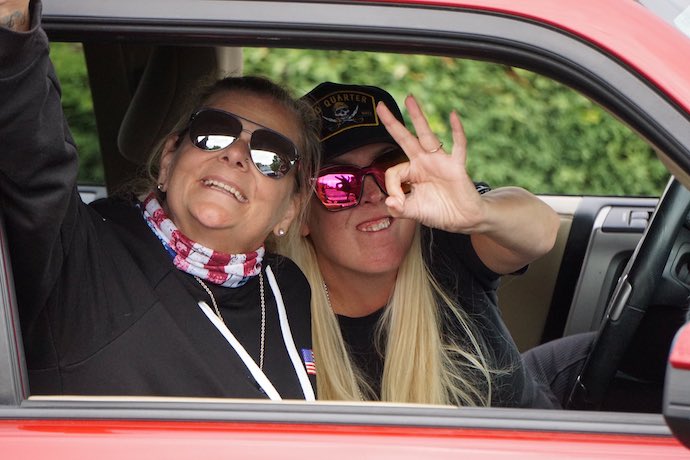Over the last couple of weeks, America’s conservative, mostly white evangelicals have once again generated considerable buzz—and deserved criticism—over their authoritarian attitudes and behaviors. For example, as Christian nationalism has featured prominently at rallies against mask mandates and the Covid vaccine around the country, evangelicals’ embrace of fascist street brawlers has caught observers’ eyes. In addition, with the withdrawal of American troops from Afghanistan and the rapid takeover of the country by the Taliban, white evangelicals’ status as the most anti-immigrant, anti-refugee religious demographic in the United States is receiving renewed attention.
Thinking on the crisis in Afghanistan. Who's less likely to favor accepting refugees? Story involves religion & race. White evangelicals are the most anti-refugee (UNLESS they're Xtian refugees), while Black Protestants & Atheists are least likely to hold anti-refugee prejudice. pic.twitter.com/WT5CIrNgvv
— Samuel Perry (@profsamperry) August 18, 2021
With respect to Afghan refugees specifically, it should be noted that the National Association of Evangelicals, in coalition with a few other evangelical organizations, released a letter urging President Joe Biden to quickly issue visas to those Afghans who supported the United States’ war effort or who are at particular risk of persecution by the Taliban. We don’t have data on evangelicals’ overall favorability toward accepting Afghan refugees just yet, but previous data and anecdotal observation strongly suggest that a solid majority of rank-and-file churchgoing evangelicals will be opposed (possibly with the exception of Christian refugees).
So, evangelical illiberalism is again in the spotlight—but is it being covered responsibly? Sadly, even after four years of enthusiastic evangelical Trump support and the clearly Christian nationalist January 6 insurrection, many American liberals and elite commentators still frequently address this topic in counterproductive ways. On the one hand, there’s the tendency to denounce white evangelicals and other authoritarian Christians as “fake Christians.” On the other, there’s the tendency to write softball pieces on evangelicals that either downplay or excuse their extremism.
With respect to the “fake Christian” tendency, dismissing anti-democratic and bigoted believers from “real” Christianity is a convenient deflection tactic that serves to absolve more liberal Christians from the necessary work of grappling seriously with the ways in which they benefit from, and are complicit in, historical and contemporary Christian hegemony and its attendant violence. Unfortunately, that hegemony is still so strong in the US that the equation of “Christian” with “good” is a habit of mind that many find hard to break. In many cases, devotion to what Lee Leviter has dubbed “the myth of Christian innocence” is a matter of such deep-seated emotional investment that even progressive Christians become defensive and passive-aggressive when called, however mildly, on how their linguistic reinforcement of Christian supremacy harms religious minorities and the nonreligious.
If you're a Christian who doesn't welcome refugees and immigrants, you're not a Christian.
— John Pavlovitz (@johnpavlovitz) August 22, 2021
Even scholars who frequently provide important and insightful analysis of evangelicalism seem at times unable to keep themselves from editorializing with prescriptive theology. More and less nuanced commentators alike have a habit of opining that white evangelicals’ majority anti-immigrant and anti-refugee stance contradicts Jesus’s statement about welcoming the stranger in Matthew 25 instead of considering how illiberal evangelicals interpret the Bible to support their nationalist politics. The Bible, after all, is multivalent and internally contradictory. To be sure, it contains passages that call for showing hospitality to strangers. It also contains passages that stir up fear of outsiders and internal enemies, including in the gospels, where Jesus talks about the coming apocalyptic future.
In fact, most of Matthew 24 and 25 consist of apocalyptic warnings, and there is no immediate contextual reason to interpret Jesus’s brief mention of welcoming the stranger as collective, rather than individual. I point this out not to support anti-refugee views—it is my strong conviction that, after twenty years of failure to stabilize Afghanistan in the aftermath of the US invasion, our country owes assistance and asylum to Afghans who fear for their future. I derive that conclusion from a secular approach to ethics.
No, I bring this up to highlight precisely that the Bible is not straightforward, that communally mediated interpretation is what shapes the political theology of particular Christian groups as opposed to some imagined “objective” approach to the Bible. In reporting on particular groups’ political influence, then, one should refrain from debating their theology (you aren’t going to convince them, but you will reinforce Christian supremacism by de facto accepting that Christian theology should be applied to American policymaking). Instead, where relevant, it would be most helpful for journalists to point out how the theology of a given group shapes its politics.
Evangelicals have a habit of imagining themselves as beleaguered and persecuted, living in “the last days,” and it is precisely this apocalyptic emphasis, easily derived from a particular reading of the New Testament, that fuels the “paranoid style” of thinking that defines the American right-wing. To be sure, the bigotry and paranoia may be prior, but reading them into biblical texts isn’t difficult, and doing so allows authoritarian Christians to use the Bible as a powerful justification for continuing their bigotry and paranoia.
Meanwhile, despite some improvement in major media outlets’ coverage of evangelicals and the broader Christian Right over the last year or so, sanitization and defense of evangelicals’ anti-pluralist, anti-democratic tendencies is still common. This month, the Los Angeles Review of Books printed the most bizarre take on evangelicals I’ve seen since InterVarsity Christian Fellowship leader R. York Moore claimed that evangelicals were intellectually serious, decent citizens not interested in conspiracy theories or grabbing worldly power—in the 1980s and 1990s. You know, at the very height of the culture wars and the evangelical purity culture craze.
But if you think that’s funny, wait till you hear what Jim Hinch thinks. A senior editor for the “inspirational” magazine Guideposts, which was founded by Donald Trump’s childhood pastor Norman Vincent Peale, Hinch would have us believe that it’s the pandemic that’s radicalized evangelicals. Taking popular California megachurch Pastor John MacArthur as his paradigmatic example, Hinch takes at face value Grace Church’s claim that MacArthur stays out of politics. It’s on that basis that Hinch claims MacArthur was apolitical until Covid-19 came along and the pastor was asked to observe some reasonable public health measures, which he not only refused to do, but over which he also sued Los Angeles County. “The tragedy of MacArthur and other evangelicals’ pandemic denialism,” Hinch laments, is that “the evangelical prioritization of growth and power that motivated MacArthur has robbed the United States of an important source of social cohesion in a time of crisis.” Never mind that evangelical subculture has been a source of division in America since well before 2020.
It’s after spending some time on MacArthur, however, that Hinch gets to what seems to be the crux of the matter for him—criticizing those of us writing pieces critical of evangelical Christian nationalism. “[A] publishing genre has emerged that could be called The (Evangelical) Plot Against the United States,” he testily snarks, arguing that journalists and commentators who are critical of white evangelical illiberalism have simply fallen to “groupthink.” Hinch does agree that the “sudden” radicalization of evangelicals is the result of long-term historical forces, it’s just that, he believes, most critics of evangelicalism are focused on the wrong ones. It’s not white supremacism or patriarchy we should be worrying our little heads about, you see. No, no. It’s the tragic corporatization of evangelical churches that really matters.
According to Hinch, ordinary evangelicals aren’t people moved by deep-seated cultural grievances tied to the ugliest elements of American history. Heavens no. They’re simply regular folks who go to church because, just like you and me, they need relief from “the challenges of elder caregiving, fraying marriages, struggles with addiction, worries about children, lost jobs, grief, regret, and overall stress.”
Per Hinch:
Christians go to church for help with everyday troubles such as these. And it is here, I believe, that a deeper explanation lies both for evangelicals’ anti-social pandemic behavior and for their larger pattern of divisive, anti-government attitudes. In recent decades, motivated by a combination of evangelistic zeal and everyday human ambition, evangelicals have embraced an explicitly business-oriented approach to ministry that has remade Christianity in the image of corporate America.
To be sure, the megachurch model has exploded in popularity since the 1980s. But evangelicals’ “divisive, anti-government attitudes” both predate and transcend the rise of the megachurch. The sentence Conspiracy theories and political extremism have filled the gap left by churches’ preoccupation with market share and media reach could only be written by someone who knows nothing (or pretends to know nothing) about evangelicalism during the Cold War. Meanwhile, Hinch writes that, “Since the megachurch movement took off in the 1990s, the percentage of Americans identifying as evangelical has declined from nearly a third to just over a fifth,” suggesting direct causality. But of course, correlation isn’t causation. And sociologists have long since established that it’s actually the evangelical culture wars and the association of American Christianity with the political Right that caused the rapid decline in religious affiliation over this period, which directly undermines Hinch’s sloppy argument.
But are megachurches in fact less equipped to meet their members’ everyday “spiritual needs” than smaller, less growth-focused churches, as Hinch claims? That question seems to me to be a highly subjective one, but even Hinch himself argues from his anecdotal observations that, regardless of their size, “a focus on one-on-one ministry and a commitment to local communities” are what have helped churches weather the pandemic. However, Hinch fails to shore up his larger argument when he points to the famous Saddleback megachurch’s model of using “small fellowship groups” to “provide the kind of personal contact and accountability otherwise lacking in large, anonymous megachurch services” as if this is a novel approach. After all, anyone who is or has been evangelical could tell you that small groups have been a staple of evangelical churches for decades.
In short, Hinch’s article is a 4466-word-long exercise in rhetorical sleight-of-hand by a man who clearly holds critics of evangelical subculture in contempt and who sees religion as an inherently pro-social force. (It is not.) Hinch himself is an Episcopalian, which I suppose gives him just enough distance from evangelicalism to make his “centrist,” “contrarian” approach to the subject of evangelical politics perfectly comfortable for him. He writes about evangelicals often, and his latest piece in LARB is far from his first overly rosy assessment of evangelical subculture. In 2016, for example, Hinch penned a contribution to the perennial (and perennially false) “the evangelical youth will be making evangelicalism normal any day now” subgenre.
I grew up with Guideposts in the home, as I’m sure many evangelicals and exvangelicals (whose voices Hinch entirely ignores) did. It’s a magazine for believers who are in love with believing, and that’s what Hinch seems to have in spades—that great (obnoxious) American faith in faith itself. Yet nowhere in his new piece does Hinch attempt to interrogate how his own biases might color his view of the evangelicals he so clearly sympathizes with.
At the end of the day, the cry of “fake Christians” and the sanitization of evangelical subculture are two sides of the same coin. Neither approach helps us understand white evangelicalism on anything but a surface level. And unless we’re willing to dive deeper, we’ll inevitably fall into reinforcing Christian supremacism, which is still the American cultural default.





